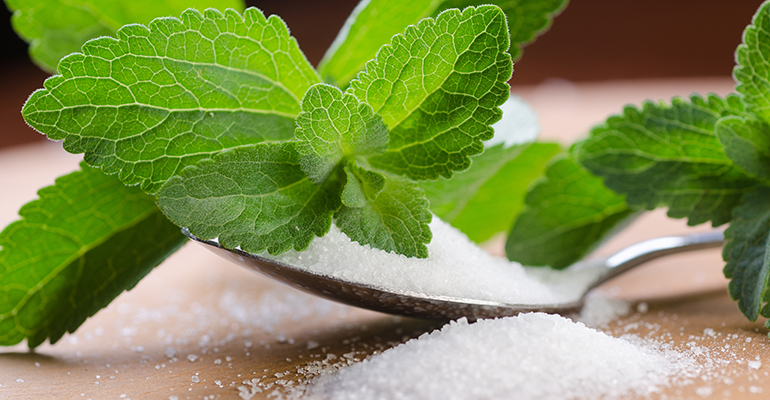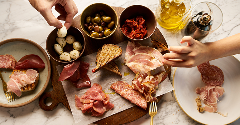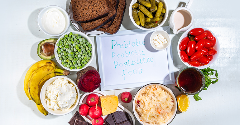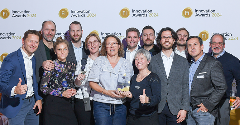News
SweeGen expands its stevia portfolio with new Reb N
28 Jan 2021Stevia manufacturer SweeGen commercialized its newest steviol glycoside Bestevia Reb N. The company says the zero-calorie sweetener has a “unique sensory profile” that makes it especially attractive for beverage applications, which is an application space that has already been exclusively licensed out.
Reb N has a “taste profile closer to both full-calorie and high intensity sweeteners,” Shari Mahon, SweeGen’s senior vice president of global application technology said in a release. This new non-GMO, high-purity stevia option adds to the company’s growing portfolio, which saw the introduction of Reb I last November, to include Bestevia Rebs M, E, I, and now Reb N.

Traditionally stevia has been a popular alternative sweetener that has been associated with a bitter aftertaste that has pushed manufacturers to produce cleaner tasting versions of this natural alternative. SweeGen has diligently worked to produce high purity extracts in order to minimize this off taste, but pure steviol glycosides have proven to be difficult to isolate due to the expense associated with extracting the trace amounts that are found on stevia leaves. Through the use of patented bioconversion technology, the company says it has reduced the cost associated with this process in order to expand access to these high-purity Rebs.
Now, “Our solutions are one of the most unique and tailored in the industry because of our access to the widest range of Rebs for sugar reduction,” Mahon said in a statement.
Having a large selection of stevia-based sugar reduction options is likely to prove beneficial for SweeGen. A report from FMCG found that 66% of consumers prefer natural sweeteners to artificial alternatives. With such demand for natural solutions, stevia has rapidly gained popularity. In 2018, the growth rate was triple that in 2017 with the number of new global product launches containing the ingredient increasing 31%.
In fact, the demand for stevia grew so significantly, that the natural sweetener alternative has become an acquisition target for companies looking to drive growth and have access to an alternative that can be introduced into their own formulations to create better-for-you alternatives. Recently, Ingredion acquired PureCircle and Tate & Lyle acquired the stevia producer Sweet Green Fields.
However, stevia is not the only popular sugar reduction method on the market. Other natural solutions include stevia, monk fruit, erythritol and allulose. Yet other opportunities exist in reducing the overall quantity of sugar in a product.
Food tech startup Better Juice focuses on reducing sugar by convert fructose, glucose, and sucrose into prebiotic dietary fibers and other non-digestible molecules. Currently, the company is focusing on using its technology to reduce the sugar in orange juice by 80% to create low-calorie, reduced-sugar products without sweeteners or other additives used to replace the sugars. Israel-based DouxMatok is working to forge partnerships with manufacturers to help them reduce the sugar quantity in products by 40%.
SweeGen is aware of the myriad of sugar reduction technologies on the market and has expanded its reach through other avenues, opening regional innovation centers last year to work with manufacturers to develop reduced sugar product alternatives that reflect local tastes. With yet another option in its arsenal, SweeGen is further investing into innovation and better-for-you products that it hopes to continue to grow.
Related news

Oat Barista: Innovation for game-changing beverages
20 Nov 2025
Oat Barista is a clean label, sustainable, and innovative drink base specifically designed to create the perfect foam in one single ingredient.
Read more
Nitrites: Pressure grows on UK to follow EU’s lead
20 Nov 2025
Pressure is growing on the UK to follow the EU’s lead after the bloc revised its regulations on the permitted levels of nitrites and nitrates in cured meats.
Read more
Empowering innovation in fortification and colouration
13 Nov 2025
Divi’s Nutraceuticals offers a large portfolio of innovative, high-quality ingredients for foods, beverages, and supplements, with bespoke solutions and expert support for product success.
Read more
Danone highlights digestive health as potential ‘tipping point’ for food industry
13 Nov 2025
Danone is betting on a food industry “tipping point” that will bloat the market for healthy products, particularly those related to gut health.
Read more
Standing Ovation and Bel scale up casein production from dairy co-products
11 Nov 2025
Foodtech company Standing Ovation has partnered with cheese specialist Bel Group to manufacture dairy serums for industrial-scale casein production via precision fermentation.
Read more
AI attraction means foodtech startups must ‘prove’ rather than ‘promise’
4 Nov 2025
Reports suggest that artificial intelligence (AI) is sucking investment from foodtech and agritech, but investors say the picture is complicated.
Read more
Will postbiotics become the go-to functional ingredient?
3 Nov 2025
Postbiotics show significant promise for the functional foods market due to their safety profile and beneficial bioactive properties, research suggests.
Read more
Meet the finalists of the Fi Europe Innovation Awards 2025
31 Oct 2025
Who made it to the shortlist of the Fi Europe Innovation Awards 2025? Read about the 23 companies making food and drink products healthier and manufacturing processes more efficient.
Read more
Penguin and Club bars no longer classed as chocolate
30 Oct 2025
Penguin and Club bars can no longer be classified as chocolate after the pladis-owned McVitie’s brands turned to cheaper alternatives amid the ongoing cocoa crisis.
Read more
Shorter drying time, sweeter success!
30 Oct 2025
Curious about cost-effective, sustainable and delicious candy making? Stefan Wessel reveals how Avebe’s solutions reduce drying time and energy use by up to 50%.
Read more